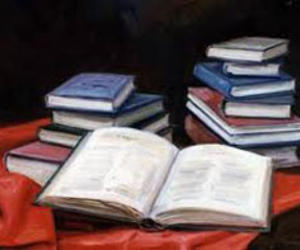In Cuba books are not luxury items
- Submitted by: manso
- Arts and Culture
- 02 / 18 / 2011

IN the midst of the world economic crisis, which is turning books into luxury items, the Book Fair in Cuba is growing and the number of exhibitors multiplying, affirmed Zuleica Romay, president of the Cuban Book Institute (ICL) at the event’s opening ceremony.
Attending the event in the San Carlos de la Cabaña Fortress were Esteban Lazo, vice president of the Council of State, and Ricardo Alarcón, president of the National Assembly, together with other Cuban ministers, intellectuals, and foreign guests.
The ICL president welcomed the Ministers of Culture from Guatemala, Paraguay, Argentina, St. Vincent & the Grenadines, Haiti, Angola, Iran and Ecuador attending the literary festival and invited authors, all of whom, she said: "will allow us a re-reading of our national histories, will stimulate knowledge of our roots and strengthen our confidence that the better and possible world to which we all aspire can be built by ourselves."
Romay highlighted the presence of more than 100 foreign exhibitors and 50 national ones, as well as the editorial effort made by the country, which has published 4.5 million editions of 513 new titles. In total, Cuban readers have access to 2,000 titles with more than six million copies, not only in Havana, but in all the island’s other provinces until March 6.
Jaime Sarusky, 2004 National Prize for Literature, and Fernando Martínez, 2003 National Prize for Social Sciences, the two literary and intellectual figures to whom the Fair is dedicated, gave speeches appreciating the honor.
Sarusky highlighted the Fair’s significance as a symbol of Cuba’s tenacity to promote and organize a publishing movement which defends authors and readers and affirmed, "To sustain this organic and coherent program for 20 years under the most difficult circumstances is an example of the island’s political will and commitment."
Martínez offered an account of his development based on studies of the processes of the Cuban Revolution and Latin America.
On behalf of member countries of the Bolivarian Alliance for the Peoples of Our America (ALBA): Bolivia, Nicaragua, Venezuela, Ecuador, Cuba, Dominica, St. Vincent & the Grenadines, and Antigua and Barbuda, guests of honor at the Fair, Ecuadorian Culture Minister Erika Silva described ALBA as an unprecedented initiative as a response to neoliberal globalization and capitalist hegemony, which represents these peoples’ desire for change in order to promote new life models based on solidarity and sovereignty."
Silva recalled that that will to integrate was initiated by Cuba and Venezuela in 2004, "so as to restore the dream of our independence leaders as the only way to develop our potential."
The Ecuadorian minister described the Fair as a space for solidarity and cultural interaction and thanked Cuba for its tenacity in celebrating 20 editions of this book fiesta.
An exquisite showcase of Cuban musical culture was presented by the Sonantas Habaneras guitar ensemble, conducted by the maestro Jesús Ortega; the National Choir, under the direction of Professor Digna Guerra; the Havana Chamber Orchestra, and New Trova singer Eduardo Sosa, who opened and closed the inaugural ceremony.
Source: /www.granma.cu/ingles/culture-i/17feb-books.html
Comments